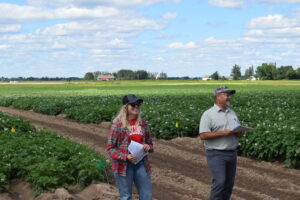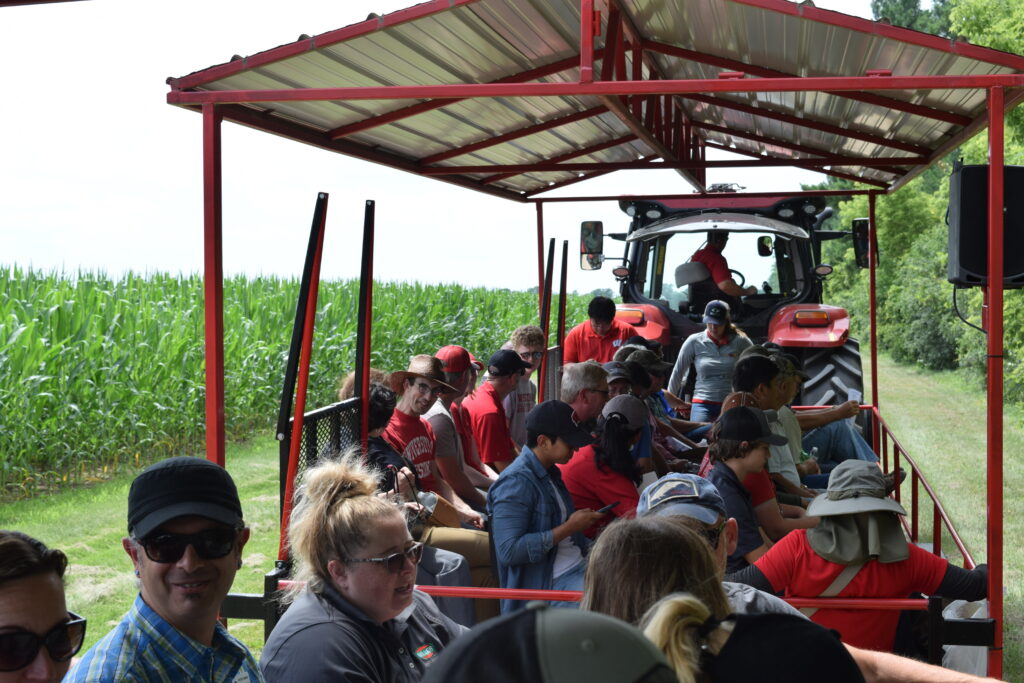Hancock and Langlade Agricultural Research Stations & Lelah Starks Farm showcase current trials
By Joe Kertzman, managing editor, Badger Common’Tater

The Hancock Agricultural Research Station (HARS), Langlade Agricultural Research Station (LARS) and Lelah Starks Farm field days were held on beautiful Wisconsin summer afternoons, July 10, 17 and 31, respectively.
Large crowds descended upon the research stations looking for information on the latest potato and vegetable production research being conducted by University of Wisconsin (UW) scientists and collaborators to help growers continue raising quality crops efficiently and sustainably while realizing high yields.
The 412-acre Hancock station, located in the state’s Central Sands potato production area, focuses on developing and evaluating ways to sustainably grow vegetables in the region’s sandy, fast-draining soils above a high-water table.
On Thursday, July 10, the UW-Madison College of Agricultural and Life Sciences (CALS) hosted its annual HARS Field Day, drawing around 100 attendees, including growers, researchers and community members from across the state.
The event began with a welcome from Mike Peters, director of the ARS network, and Sen. Rachael Cabral-Guevara (R-District 19), who was honored with the Friend of Agriculture Award for her continued support of Wisconsin’s agricultural research infrastructure.
Sen. Cabral-Guevara authored a budget motion to increase funding for UW–Madison’s agricultural research stations by $2 million to help upgrade facilities and equipment.
“I wasn’t aware that this facility was as amazing and impressive as it is until I had the opportunity to come out here and hear from the scientists and the students,” Cabral-Guevara said.
GLOBAL IMPACTS
“This isn’t just something that benefits the students and researchers, this is something that many of our community members utilize for their farms and their growth,” she added. “It has impacts across the state, our county and the world.”
The budget motion authored by Cabral-Guevara details the importance of the stations. The agricultural research stations operated by UW are the research and development laboratories for Wisconsin’s $104 billion agricultural sector, hosting more than 1,350 studies annually.
Wisconsin farms deploy the practices tested at these stations to improve their economic returns, protect natural resources and provide healthy, nutritious food for consumers.
“Our work here is driven by collaboration with faculty, industry partners, producers, students and policymakers,” Peters said. “Sen. Cabral-Guevara is a key collaborator who is advocating for the research and development arm of the State of Wisconsin.”
After welcoming remarks from HARS Superintendent Troy Fishler and UW Storage Research Facility Manager Amber Walker, field day attendees boarded wagons for a guided tour of six field sites, where researchers presented updates on key initiatives.
Topics included potato diseases, insect and weed management, potato breeding efforts to improve yield and quality, neonicotinoid and nitrate load losses from sandy soils, plus other water quality studies and precision agriculture technologies.
Extension Soil Scientist Dr. Matt Ruark gave a nitrogen optimization update, Dr. Jeffrey Endelman, UW Department of Plant and Agroecosystem Sciences, provided a potato breeding program update, and Dr. Russ Groves, UW-Entomology, presented “Insect Management in Potato and Processing Vegetables.”


